The Bharat Singh Chauhan Interview (2)
Bharat Singh Chauhan is a noted International Organiser and the President of Delhi Chess Association. He is also the CEO of the All India Chess Federation (AICF), Deputy President of the Asian Chess Federation, Chairman of the Commonwealth Chess Association, and the Chairman of the FIDE Technical Commission. To the chessplayers in India, he is better known as the organiser of the best tournament in India in terms of quality and the prize fund. ChessBase India did an in-depth interview with Mr. Chauhan, who talked about chess in India, the work of AICF in developing chess, his ideas of making chess richer and spectator friendly, nurturing of young talents, entrepreneurship, the economics of chess, chess in schools programme, and more. Here is the second of our three-part interview.
The Bharat Singh Chauhan Interview (2)
To the chessplayers, he is better known as the organiser of the best tournament in India in terms of quality and the prize fund. His meticulous nature is visible by just noting the security arrangements at the tournament venue.
ChessBase India did an in-depth interview (we mean it!) with Mr. Chauhan, who talked about chess in India, the work of AICF in developing chess, his ideas of making chess richer and spectator friendly, nurturing of young talents, entrepreneurship, the economics of chess, chess in schools programme, and more.
In this second part, he talks about chess entrepreneurship, future tournaments, his strategies to promote chess that he implements, young talents and chess in schools.
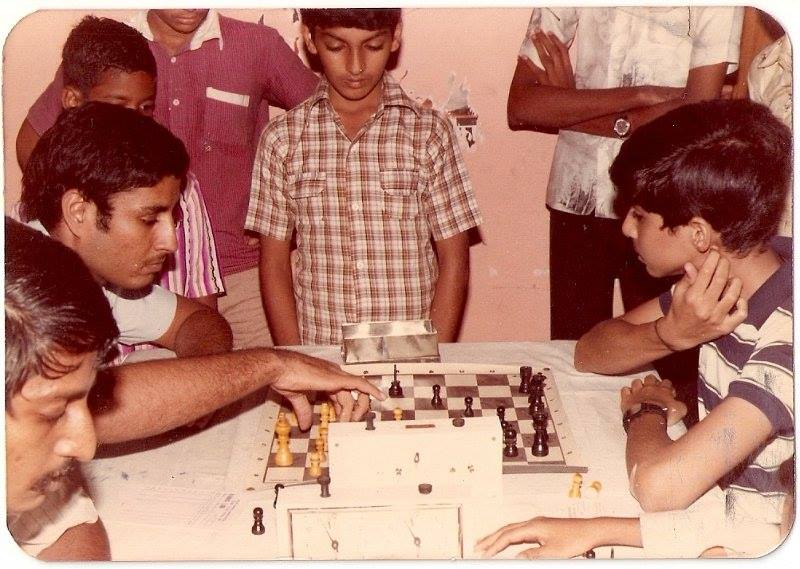
You have an idea, you want to get results — making an idea is one thing, getting results requires efforts and execution. What are the basic skills? As an entrepreneur, if one wants to convert an idea into results, what’s the process?
The number one thing is you require a lot of money. I had a friend, Pradeep Jain, he is the owner of the Parvnath developers. I went to ask him for a banner of RS. 20,000 in 2001 for the Delhi tournament. So he said, what is this 20,000? You are my friend! You ask me something big and I’ll do it. Then I asked him: now this is an international tournament, can you sponsor it? From that day till today he is supporting all the tournaments- nationals level, state, etc. Therefore, money is one thing. For the Delhi event, that part he took care initially. Second is the team. Of course, we had this good team in Delhi. There are people, dedicated ones, who are working day and night. You won’t believe that most of us ten people conducting this tournament, we did not sleep for this event for many days. For me itself, I did not sleep three nights because we get more numbers, this is winter in Delhi, we have to give players the hotels. We’ve given 600 rooms for the players. It’s not easy to find 600 decent rooms with hot water and all that. We had really tough time and changing the tournament hall and accommodating all the people — it is tough.
So the first thing is money and the second thing is a really good team, you cannot do it alone?
A good team is very important. You have a good idea but you need money and a good team to execute it.
How do you select the people for the team, what criteria do you look at?
Hard work. In the forces, if somebody tells it has to be done, it has to be done. I should have confidence that if I tell him to do this, I shouldn’t think about that work again, it should be done. I presume it is done and I proceed to next level. There are lots of things from both sides, you have to give them a lot of priority and lot of privilege and lot of respect. It is not my event or I’m not the big boss. I treat it as our effort, team effort. I see a person is good and is involved, I will put him in a certain department and make him manage it. There are many people who come and go from our team. But there are people who are sticking — core team members. We have three-four team members and you will not find many volunteers or many big workers. Usually, in this kind of tournament, you’ll have some 200 volunteers. Too many people can sometimes spoil it. We have core team members like we have Gopakumar, he is doing all these accounting work. We have one person dedicated to accommodations. Like that, some four-five of us. One thing is common in all the factors — passion for chess. That has to be there. Our team members, they don’t do it for the money. They do it for their passion.
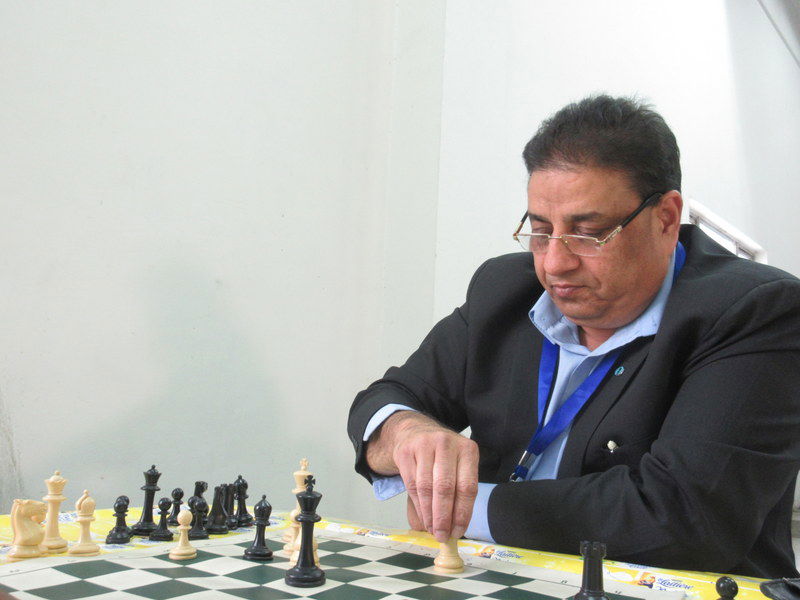
Yesterday (after the round) when everything was done, everybody was playing chess here...
We enjoy chess, that is why we are doing it. I mean these eight days of the tournament are very stress-free for me. I’m here all these days enjoying chess, playing chess, late night chess and all that, it’s all chess. These eight days are very comfortable for me because I have to be here and just look after some small stuff. It’s a holiday for me actually.
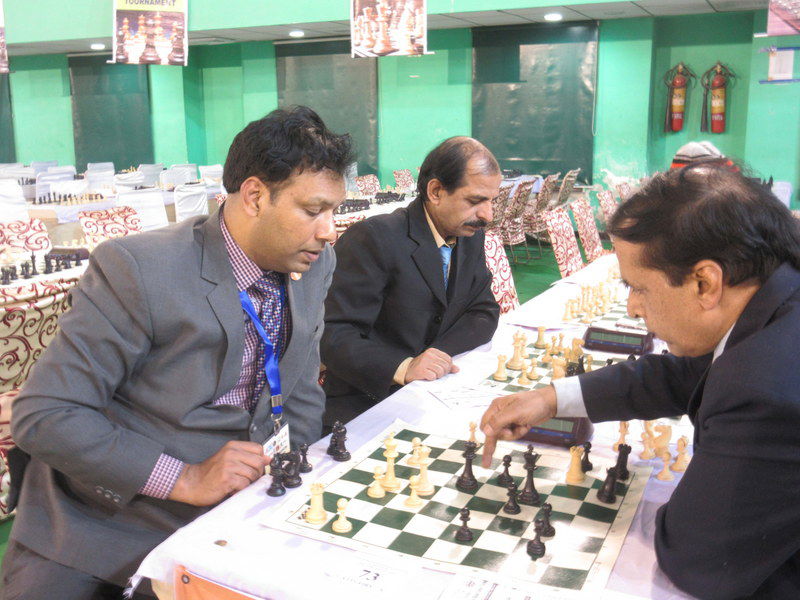
Earlier the idea was to get the grandmasters and then slowly your aim started going downwards, towards the base...
The only way to develop chess, according to me, is chess in schools programme. Because you get the maximum number only in schools. You have a plan A-B-C and then you execute chess in schools.
We will come to that later. Apart from that what are the other smaller goals you have?
To have a good team of grandmasters and win medals in different international categories and one of the goal is to have big category tournament where the cream of the world top players can play.
When can we see Wijk Aan Zee or London classic in India?
It is very difficult to say when but definitely it is in the pipeline, very soon you’ll hear about the category tournaments. We may not be so strong immediately. We will upgrade slowly with decent category tournaments.
Do you think it’s a good idea to have such a structure for a top level tournament?
Yes, it is very important to have a category tournament, grandmaster event or maybe some school event or below 2000 or below 1600 — all kinds of tournaments in one chess festival. You get the maximum mileage of it.
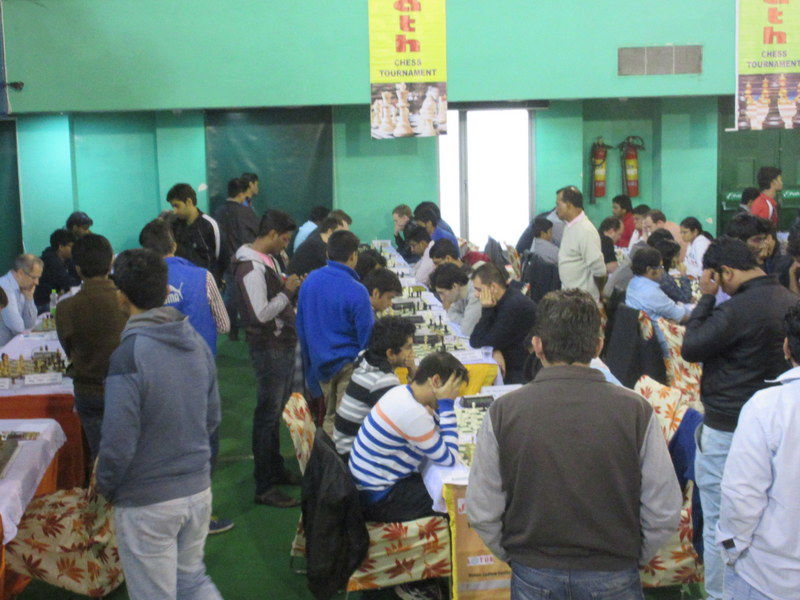
We come to watch the grandmasters playing from our own category tournament running simultaneously and chess suddenly becomes a spectator sport. ‘C’ category players become spectators watching the games of the higher categories.
Yes. Another thing: to call people, you have to tell them what are the good things about chess. Second most important thing is your players, you have to tell the public that these are really the stars, you have to showcase your chess players as stars then only people start saying, “Oh he is a big man, I want to become Anand, I want to become Parimarjan Negi, I want to become Tania," and more and more interest will come. We have to tell the benefits of chess.
When will we see Carlsen playing here?
I don’t know about Carlsen but certainly a decent category tournament we will be having within one year. My idea is to have this festival with all kinds of tournaments. It will be best to have category tournament because you are not just bringing 3000 players, there are actually more players you are bringing to chess — their parents, their grandfather, their grandmother everybody is coming, the coaches , the mother, and the grandmother are watching the game. They are also starting to understand chess and this is our aim, to teach everybody.
And this is one method of doing it?
Probably this is the best method of teaching other people who are not in sports.
So if this happens, we have a new Parsvnath coming up within this year itself?
I’m not sure which city. Probably one of the cities will have the big tourney very soon. It will take some time, all top players their schedules are really tight. Suppose we have a tournament in October, we have to write dates now. It is already in the pipeline.
Are you taken aback when the young talents you publicise so much sometimes leave the game?
Of course, they are young people and their choice is their own. As a promoter, I feel sad because but it is ultimately their own life and they have to decide what to do. But I tell you, it is the most difficult work to develop chess in Delhi, it is not like Maharashtra or Tamil Nadu or West Bengal. Maharastra, West Bengal and Tamil Nadu have chess culture, but in Delhi, not many are interested in chess. Delhi life is completely about showing off! Therefore, making 4-5 GMs in this city, equivalent to Maharastra, required hard work. As I said, you have to portray your players as big stars and then only a lot of people come. For example, Vantika Agarwal was arriving after winning the bronze medal at the World Youth. She came 3 O'clock in the morning and I was down with asthma but still I made a point, against the wishes of my wife, to receive her at the airport. Because we have to show them that we really love them and this is something very big they have done. And for others also to feel that if we do this we’ll be very big people and very important for everyone. So these are the things: I feel we’ve to make them stars.
To make others feel like, I want to be there, that’s a psychological ploy you use?
Yes, otherwise it is very difficult to get good players in Delhi!
I think you’ve been very successful in implementing this particular strategy because kids have started taking this game seriously and you said you’ve booked 600 rooms that mean 1200 players?
Something around 1000 players.
...staying in rooms, which means the other part, the other half, 1000 players, are from Delhi itself? [Total players in Delhi Open 2016: 1855]
Yes, Delhi, nearby places, and NCR.
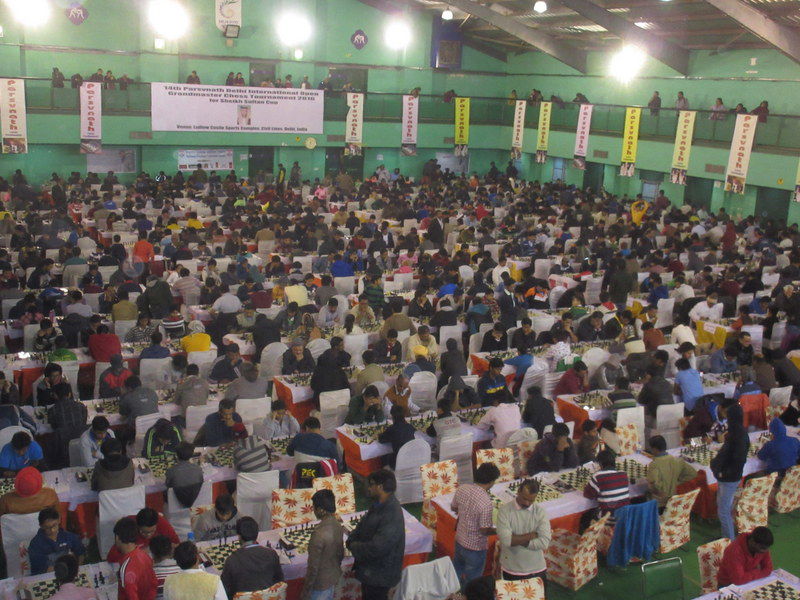
Let’s talk about our men's grandmasters. We won the bronze last time and, incidentally, China and India won medals together for the first time and China is ahead of us at least in that part. Your strategy is to focus on the base of the chess pyramid while the Chinese mostly focus on their top players. It’s like Hare vs our Tortoise, who’ll win? Our own Olympiad team, women's team, what are the concrete steps the AICF is taking to develop the team into a strong unit?
We've already made a committee, conducting coaching camps, and also one interesting idea is to make women players play against junior players like Nihal, Praggnanandhaa, and other medal winners. Good for the women's team as well as good for the youngsters. So basically with one thing we are getting two categories in shape, so it’s part of our preparation for Olympiad and for the women's team we are willing to give more.
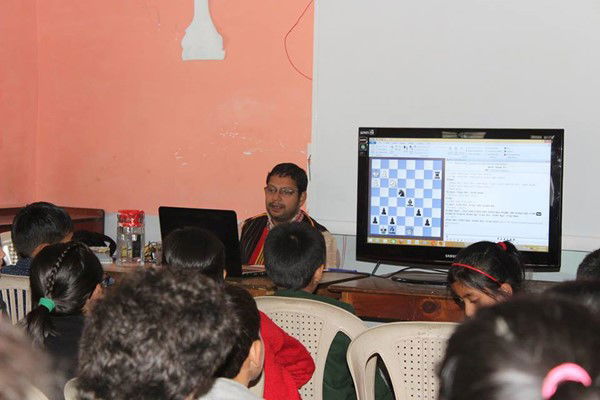
We've already made it to the podium in the Open, now let us target the women's medals, is it that idea?
Practically, Indian women playing chess — you know our scenario in India, once a woman gets married, chess life almost stops. We have a different culture in our country: for us children are everything and women are supposed to take care of kids. I think the women's chess requires big attention because of our conditions in our country. It must change.
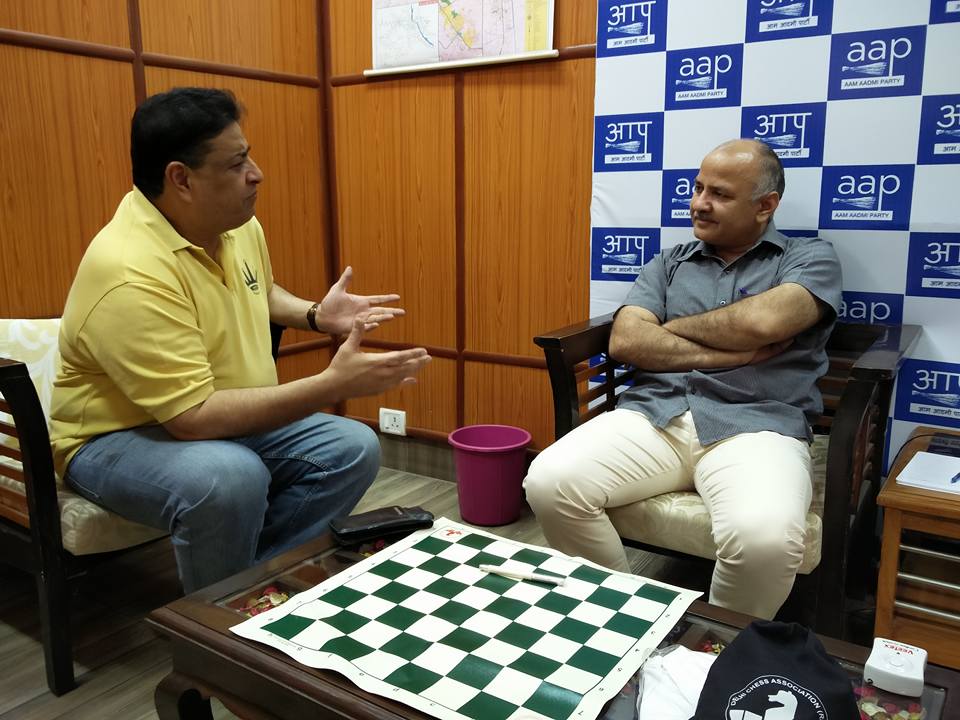
Speaking about chess in schools, you said that there’s a plan A, plan B, plan C. Can you tell us the concrete steps the AICF has been taking?
We have two-three kind of schools and plan is very simple. AICF has decided to train the school children in three levels. In the first level we have decided to train the teachers — any state that wants training for teachers, AICF will provide free trainers for chess at AICF's cost. The second level — there are a lot of private schools that can afford the money, they are having private coaches from outside. But still we are insisting that the school teachers be trained because at one point in time if the number grows we’ll be short of coaches. We need people from basic level to teach them. The idea of chess in school is, if this succeeds, all the former players will get the income. They’ll become trainers. This is a job for them, they can continue with their profession. Players themselves are involved in this. Basically, we are utilising the resources we already have for creating resources for the future. Now our sports does not attract much sponsorship. If we have 5000 players playing a tournament, then probably we don’t require sponsors, it becomes self-sufficient. You are creating jobs for your former players, you are making a better India because I’m sure learning chess means they’ll be good in studies and will be away from bad things which nowadays kids are diverting to. Everybody will benefit, the people who are in chess equipment field also! They will sell chess sets, chess books, they’ll make money. The district associations, the clubs, everybody, for everyone it is a win-win. Everybody will get money, so I don’t see any bad things in chess in school. Former players are in very bad conditions, but have you heard anything in last one year or two years? You hear that there is no money? For example, there is this person named Rafi Khan here. He was the No. 02 player Delhi, and now teaches kids. He has brought some 10 children to this tournament. He was in bad shape, now no former player is in bad shape. The coaching has become a big business and in Delhi, the coaching business is around one crore for one month. One crore rupees shared by coaches in Delhi. People from different places are coming and migrating to Delhi to coach the kids and so by doing chess in schools you are doing something very good for the country, generating revenue. As I said, everybody involving in our sport means more power politically. We are a democracy, if we have more number of players, then we have produced power.

Then, when we say that we want something from the government, they have to bend because we have that bigger numbers.
Even the chess portals. I’ll tell you that ChessBase is doing a wonderful job all over the world and probably has the maximum followers. I mean there is a website, Playchess, and all the information packed in those DVDs and all which normally very hard to find. And now we have Chessbase India. This is the very good for Indian chess because media is neglecting our news and you people can force others to come into chess. The kind of pictures and write-ups, games, etc. that you people are producing is excellent and makes people want to play chess! This is really good and I feel really good about ChessBase.
To be continued...

